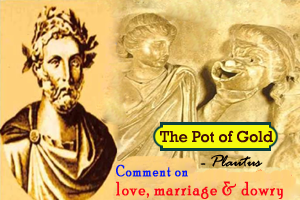Plautus’s The Pot of Gold
(Comment on love, marriage and dowry)
Q. Plautus’s The Pot of Gold is a comment on love, marriage and dowry
Answer: Plautus's play The Pot of Gold is a comedy that offers commentary on the topics of love, marriage, and dowry. The play tells the story of Euclio, a poor man who discovers a pot of gold in his backyard and becomes obsessed with keeping it safe. The play uses Euclio's obsession with his newfound wealth to satirize the social customs and expectations surrounding marriage and dowry.
One of the key themes in The Pot of Gold is the idea that wealth and material possessions are often prioritized over genuine love and affection. Euclio is so consumed by his desire to protect his gold that he is unable to think about anything else, including the well-being of his daughter, Phaedria. He is particularly concerned with ensuring that Phaedria marries a man who can provide a substantial dowry, rather than focusing on whether or not the man is a suitable match for her.
The play also satirizes the traditional gender roles and power dynamics within marriage. Women are often treated as commodities to be traded for wealth and status, and their desires and feelings are often ignored or dismissed. In The Pot of Gold, Phaedria is initially promised to a wealthy but foolish suitor named Megadorus, despite the fact that she is in love with another man, Lyconides. The play ultimately resolves this conflict by having Euclio realize the error of his ways and allowing Phaedria to marry for love rather than for wealth and status.
Another aspect of the commentary on love and marriage in The Pot of Gold is the role of deception and trickery. Throughout the play, characters manipulate each other to achieve their own desires, often through the use of lies and deceit. For example, Lyconides pretends to be a slave in order to win Phaedria's affection, while Euclio employs various schemes to protect his pot of gold from those who would try to steal it. The play suggests that deception is often necessary to navigate the complicated and often unfair social customs surrounding love and marriage.
Furthermore, the play also critiques the notion of love as a commodity that can be bought and sold through the exchange of dowries. The characters in the play view marriage primarily as a financial transaction, with the size of the dowry being the most important factor. This emphasis on material wealth over emotional connections is seen as problematic, and the play ultimately suggests that love and happiness cannot be bought or sold.
In fact, Plautus's play The Pot of Gold also highlights the social and economic inequalities that exist in ancient Roman society. Euclio's newfound wealth allows him to climb the social ladder and gain access to a higher status in society, while other characters are relegated to lower social positions due to their lack of wealth. The play critiques the notion that social status and wealth are the most important factors in determining one's value and worth.
Finally, The Pot of Gold also touches on the idea that greed and obsession can lead people to behave in irrational and destructive ways. Euclio's desire for his pot of gold drives him to take extreme measures to protect it, including burying it in a secret location and hiring guards to watch over it. This obsession ultimately leads to his downfall when he is exposed as the owner of the gold and becomes the target of various schemes and plots.
In summary, The Pot of Gold is a commentary on love, marriage, and dowry that critiques societal norms and emphasizes the importance of genuine emotions and connections over material possessions and social status. The play also highlights the role of deception and manipulation in navigating these societal customs and critiques the social and economic inequalities that exist within ancient Roman society.
*****
Read also:
👉 Fate and Free Will in Sophocles’ Oedipus the King
👉 Varieties of human language with suitable examples - Paper: L1-1 (Semester I)
👉 Expressive forms of language with examples from English - Paper: L1-1 (Semester I)
👉 Distinctiveness of Human Language - Paper: L1-1 (Semester I)
👉 Abhijnanasakuntalam :Sakuntala’s departure from the Hermitage of Kanva
👉 The Book of Assembly Hall– Dharma, Dicing and Draupadi
👉 Mahabharata – Discuss the Mahabharata in the light of Epic Tradition
👉 The Character of Achilles, The Illiad, (Book – I and Book II)
